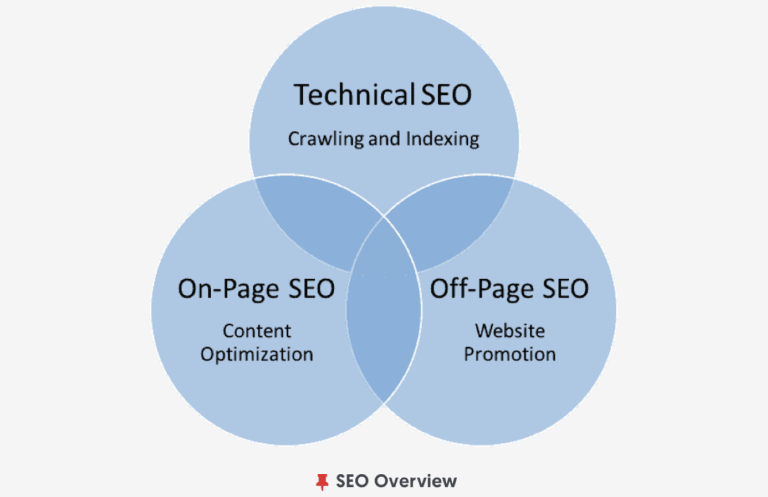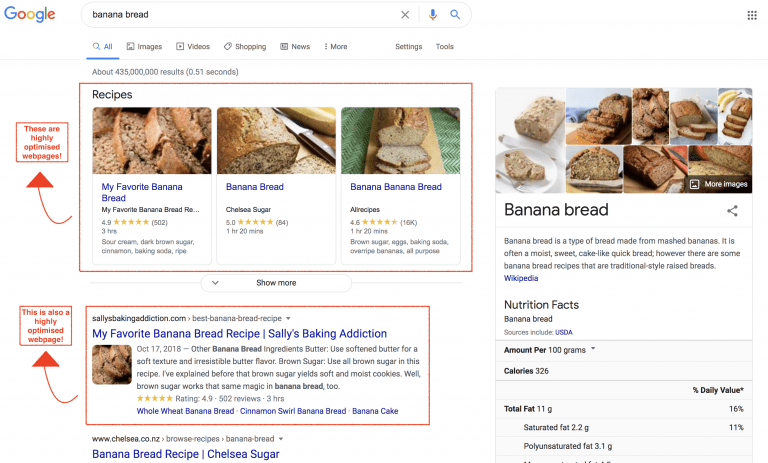Did you know? Approximately 5.6 billion searches are made on Google! And this isn’t taking into consideration other search engines. That’s a lot of searches!
You may be wondering, well, how can your website show up on the first page of Google or as a top result when someone searches? The answer is simple: Through the use of SEO which also stands for Search Engine Optimisation.
Definition: SEO or Search Engine Optimisation is a marketing strategy to increase the rankings and visibility of online content on a search engine in the unpaid section, a.k.a organic listings.
In other words, Search Engine Optimisation (SEO) is the process of optimising your online content (e.g., websites) so that a search engine like Google or Bing likes to show it as a top result for searches for a particular keyword.
For instance, let’s say you wrote an article on a website about making banana bread. You want the search engine (Google) to show your article as the top result to anyone who searches for the phrase “banana bread.” By using SEO on your article, it will encourage Google to show your article as one of the top results whenever someone searches for that keyword “banana bread.”
What are main components to SEO?

- Technical SEO helps to ensure that search engines can crawl and index your online content/website without any issues. Otherwise, it can negatively impact your website’s page rankings.
- On-Site SEO which are the rules that are applied on a website and content to make it search engine friendly. On-Site SEO is used to provide search engine crawlers with enough signals to help them understand the meaning of the context of a website’s content. On-site SEO involves the website structures, keywords, title optimisations, headings, image SEO, internal links, and other techniques that can help direct the correct signals to search engines.
On-Site SEO can help improve the usability and credibility of your online content.
- Off-site SEO which are the methods that help promote your online content, such as a website or blog in order for it to rank higher in search result pages. It is also referred to as link building or backlinks (the number of incoming links from other websites). This is one factor that helps determine a website page’s position on the search engine results page (SERPs). Backlinks provide a signal of trust, and if they are high quality links which are sourced from well-known and trusted websites, it can help increase a website’s ranking.

SEO can be conducted in two manners either at an ethical standard or an unethical standard:
- Black Hat SEO or Unethical SEO – are known as aggressive and improper SEO practices. These practices include keyword stuffing and invisible text that disobey search engine guidelines to attain higher rankings on search engine result pages. These tactics often result in websites becoming banned from search engines.
- White Hat SEO or (Ethical SEO) – are known as proper practices that obey search engine guidelines and focus on a human audience in order to attain higher rankings on search engine result pages. It uses tactics such as keywords, link building, and writing quality content.
SEO is essential for businesses. An ethical SEO approach can drive more website or blog traffic, increase the number of customers, generate more company sales, and fulfil business objectives.
Interested in learning more about SEO? Why don’t you study the Diploma in Digital Marketing with the New Zealand Institute of Education (NZIE). It’s a Level 7 NZQA accredited course that teaches you all about SEO and how you can start your career towards becoming an SEO Specialist.
Click here to start your exciting journey! Don’t delay; spaces are filling out quick!


